
Hermann Ebbinghaus became the first psychologist to systematically study learning and memory by carrying out a long, exhausting experiment on himself.
Philosophers such as John Locke and David Hume had argued that remembering involves association-linking things or ideas by shared characteristics, such as time, place, cause, or effect. Ebbinghaus decided to test the effect of association on memory, recording the results mathematically to see if memory follows verifiable patterns.
Brief biography
Hermann Ebbinghaus was born in German on January 24, 1850. In 1867 he went to the University of Bonn and somewhat later to Berlin and Halle. Although his initial interest was in history and philology, he was gradually drawn to philosophy.
When the Franco-Prussian War broke out in 1870, Ebbinghaus joined the Prussian Army. In the spring of 1871, however, he left the Army to continue his philosophical studies at Bonn. He completed his dissertation and received his PH.D. on August 16, 1873, passing his examination with distinction.
In 1885 he published Memory: A Contribution to Experimental Psychology. He was made a professor the same year, probably in recognition of this publication.
In 1886, he established and opened an experimental psychology laboratory at the University of Berlin for psychological research and study purposes. In the years following, Ebbinghaus co-founded the Zeitschrift fur Psychology und Physiologie der Sinnersorgane (Journal of Psychology and Physiology of the Sense Organs), a literary establishment often credited with the international advancement of psychological study.
Memory experiments
Ebbinghaus started by memorizing lists of words and testing how many he could recall. To avoid the use of association, he created 2,300 “nonsense syllables,” all three letters long and using the standard word format of consonant-vowel-consonant: for example, “ZUC” and “QAX.”
Grouping these into lists, he looked at each syllable for a fraction of a second, pausing for 15 seconds before going through a list again. He did this until he could recite a series correctly at speed. He tested different lengths and different learning intervals, noting the speed of learning and forgetting.
Ebbinghaus found that he could remember meaningful material, such as a poem, ten times more easily than his nonsense lists. He also noted that the more times the stimuli (the nonsense syllables) were repeated, the less time was needed to reproduce the memorized information. Also, the first few repetitions proved the most effective in memorizing a list.
When looking at his results for evidence of forgetting, Ebbinghaus found, unsurprisingly, that he tended to forget less quickly the lists that he had spent the most time memorizing and that recall is best performed immediately after learning.
Ebbinghaus also uncovered an unexpected pattern in memory retention. He found that there is typically a very rapid loss of recall in the first hour, followed by a slightly slower loss so that about 60 percent is forgotten after nine hours. After 24 hours, about two-thirds of anything memorized is forgotten. Plotted on a graph, this shows a distinct “forgetting curve” that starts with a sharp drop, followed by a shallow shape.
Limitations
There are several limitations to Ebbinghaus’s work on memory. The most important one was that Ebbinghaus was the only subject in his study. This limited the study’s generalizability to the population. Although he attempted to regulate his daily routine to maintain more control over his results, his decision to avoid the use of participants sacrificed the external validity of the study despite sound internal validity.
In addition, although he tried to account for his personal influences, there is an inherent bias when someone serves as the researcher as well as the participant.
Also, Ebbinghaus’s memory research halted research in other, more complex memory matters, such as semantic and procedural memory and mnemonics. Yet, Ebbinghaus’s research launched a new field of inquiry and helped establish psychology as a scientific discipline. His meticulous methods remain the basis of all psychological experimentation to this day.

